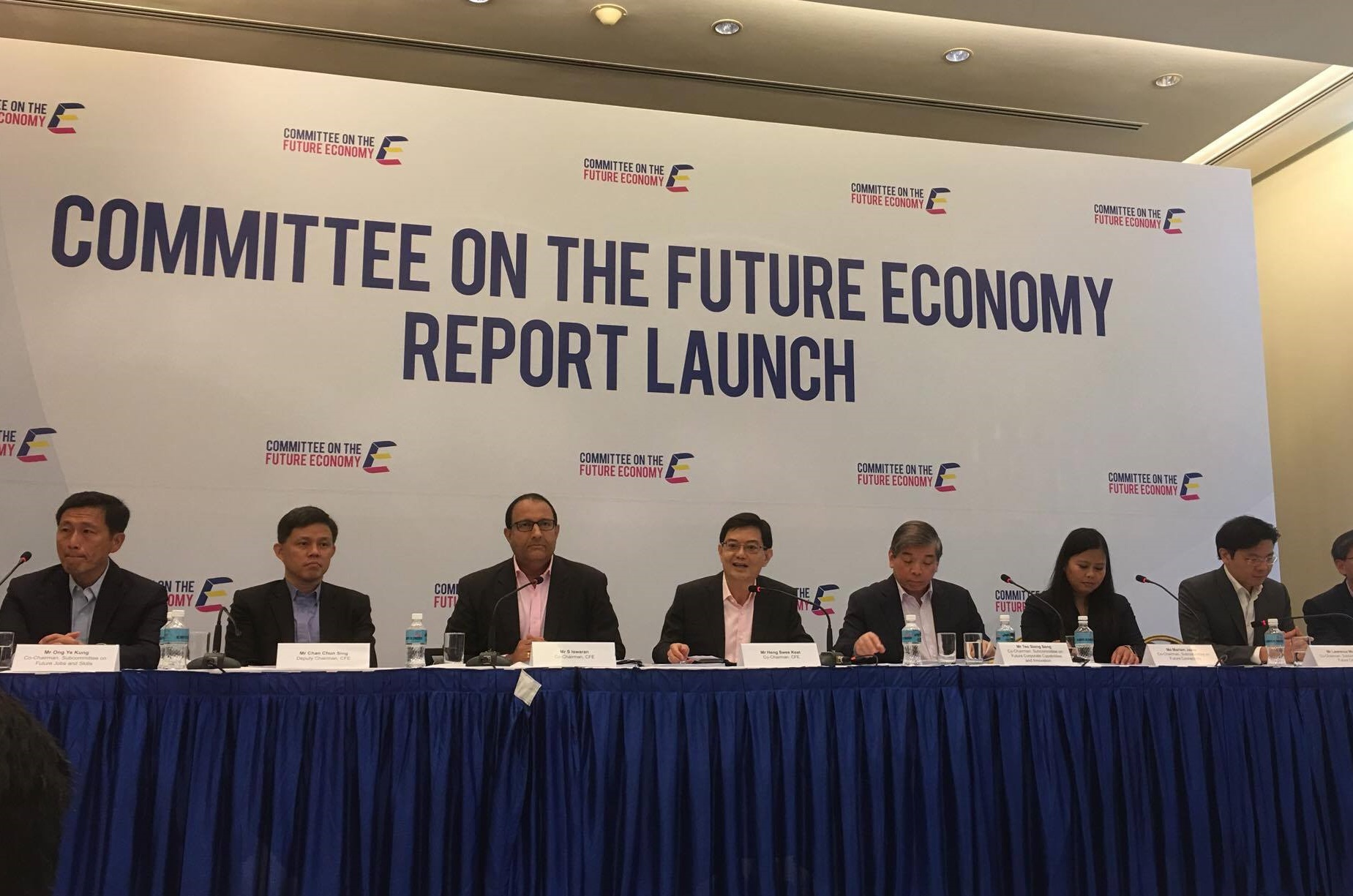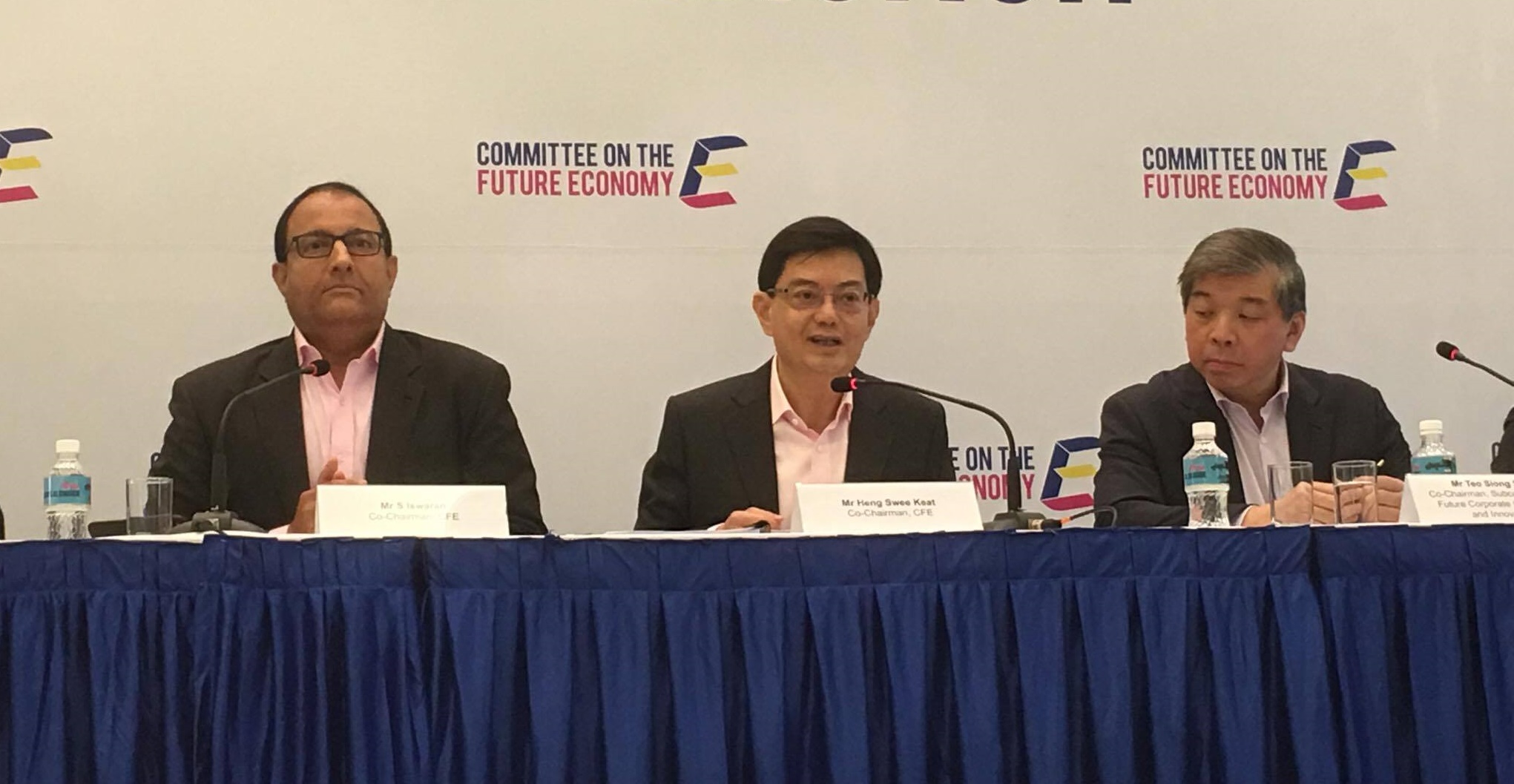It must be a really really important press conference.
Afterall, it is a unique press conference fronted by not one, not two, but five Ministers:
Heng Swee Keat [Finance Minister];
S Iswaran [Minister for Trade and Industry (Industry)];
Chan Chun Sing, [Minister in the Prime Minister's Office];
Lawrence Wong [Minister for National Development]; and
Ong Ye Kung [Minister (Higher Education and Skills)].
 [From left-to right: Ong; Chan; Iswaran; Heng; committee members Teo Siong Seng, and Mariam Jaafar; and Wong.]Photo by Chan Cheow Pong.
[From left-to right: Ong; Chan; Iswaran; Heng; committee members Teo Siong Seng, and Mariam Jaafar; and Wong.]Photo by Chan Cheow Pong.
And it is not General Election (GE) period yet.
Committee on the Future Economy Report
This is the press conference for the launch of the Committee on the Future Economy (CFE), co-chaired by Heng and Iswaran.
Convened in January last year, CFE aimed to review Singapore's economic strategies and its work is now completed. Its recommendations have been compiled into a report.
Prime Minister Lee Hsien Loong thanked both Ministers for their recommendations and thanked the members of the Committee, the Subcommittees and the working groups for all the hard work.
PM Lee noted that developing the strategies is just the first step, adding that "what counts is how well we implement them to transform our economy".
First, numbers: It has consulted over 9,000 stakeholders, including trade associations and chambers, public agencies, unions, companies, executives, workers, academics, educators and students.
Second, the vision: For all Singaporeans, young and old, to be the pioneers of the next generation (Just like our pioneer generation, I guess). The report hopes that Singaporeans continue to adopt life-long learning
Third, the Ministers' views:
Heng said,
"The CFE recommends that, in the face of unprecedented global challenges and greater uncertainty, our response must be to keep Singapore relevant to the world. The CFE's strategies and recommendations will help us keep Singapore open and connected to the world, while building deep capabilities in our people and businesses to benefit from the opportunities that we can create".
Iswaran added,
"With rapid changes in the global economy, the imperative for Singapore remains the same - to be an open economy that is connected to the world and relevant to its needs...
Ultimately, our efforts must translate into better opportunities for all Singaporeans, with sustainable wage growth and meaningful careers, and a conducive environment for firms to start, grow and soar."
Still with us?
Cool.
The CFE has come up with seven strategies (like the gathering of seven samurai) to achieve the above mentioned vision.
Anyway, below are the seven strategies:
1. Deepen and diversify our international connections.
This means Singapore will move forward with like-minded partners to advance the liberalisation of trade and investment. It also includes setting up a "global innovation alliance" with universities and companies overseas.
2. Acquire and utilise deep skills.
- To do so, training providers and tertiary institutions will have to facilitate how such skills are acquired. One way is to provide training programmes that are more modular and more technology-based. Better still if the government can support how these new skills can be used and applied.
3. Strengthen enterprise capabilities to innovate and scale up.
- An "innovation ecosystem" of commercial-oriented entities that can commercialize findings and intellectual property of our research institutions will help. The government should support enterprises to scale up and internationalise, and get the private sector to provide more growth capital.
4. Build strong digital capabilities.
- This means helping SMEs adopt digital technoligies, supporting the development of analytics and cyber security expertise, and using data more effectively.
5. Develop a vibrant and connected city of opportunity.
- In other words, the government will invest in initiatives that boost our connectivity externally (Changi Airport, KL-Singapore High Speed Rail) and redevelop our land to create new space.
6. Develop and implement Industry Transformation Maps.
- The ITMs cover 23 industries and about 80% of the economy. These road-maps are platforms to plan and implement strategies.
7. Partner each other to enable growth and innovation.
- This means greater roles for trade associations, unions and the need to create a regulatory environment to support innovation and risk-taking.
What about the KPIs?
Singapore should grow by 2-3% per year, and exceed the performance of most advanced economies.
Just in case one is looking for some Nobel prize-winning idea or strategy, this is not that type of report.
What counts of course is the implementation and execution of these strategies.
But that's a story for another day.
Articles you should also check out since you're here:
Not an art person? Here’s how you can still enjoy the Singapore Biennale.
6 times S’pore toyed with food and made a global impact
Top photo by Chan Cheow Pong.
If you like what you read, follow us on Facebook and Twitter to get the latest updates.
If you like what you read, follow us on Facebook, Instagram, Twitter and Telegram to get the latest updates.
